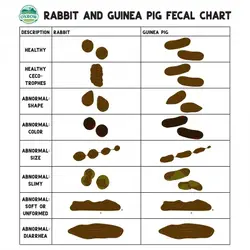PigglePuggle
Senior Guinea Pig
I was just writing a bit of a lecture about guinea pig digestive health and I googled "guinea pig poops" and found that Oxbow Animal Health actually have this helpful poop guide for piggies and bunnies on their website! It's not spot on accurate but thought it might be helpful for new owners, seeing as we all love piggy poop and might not be sure what's normal 


